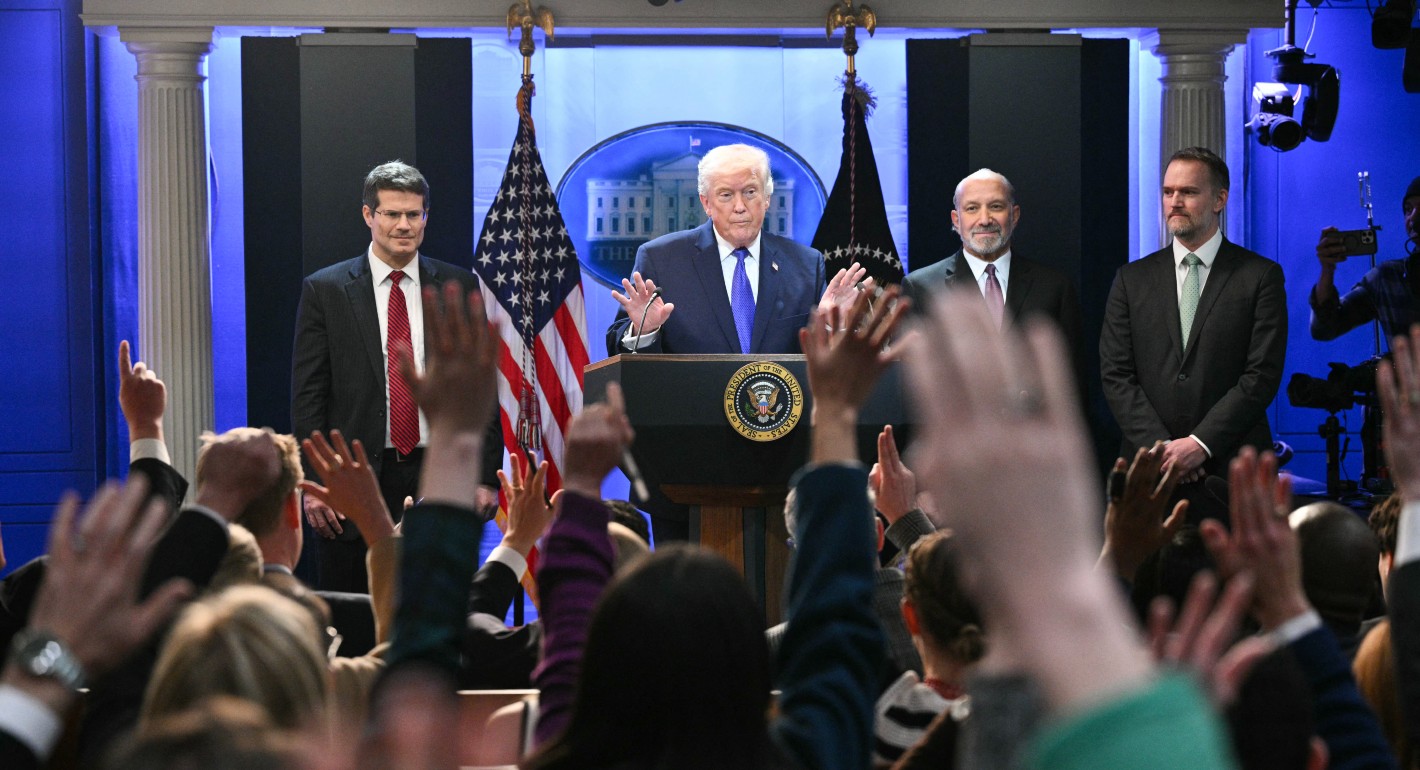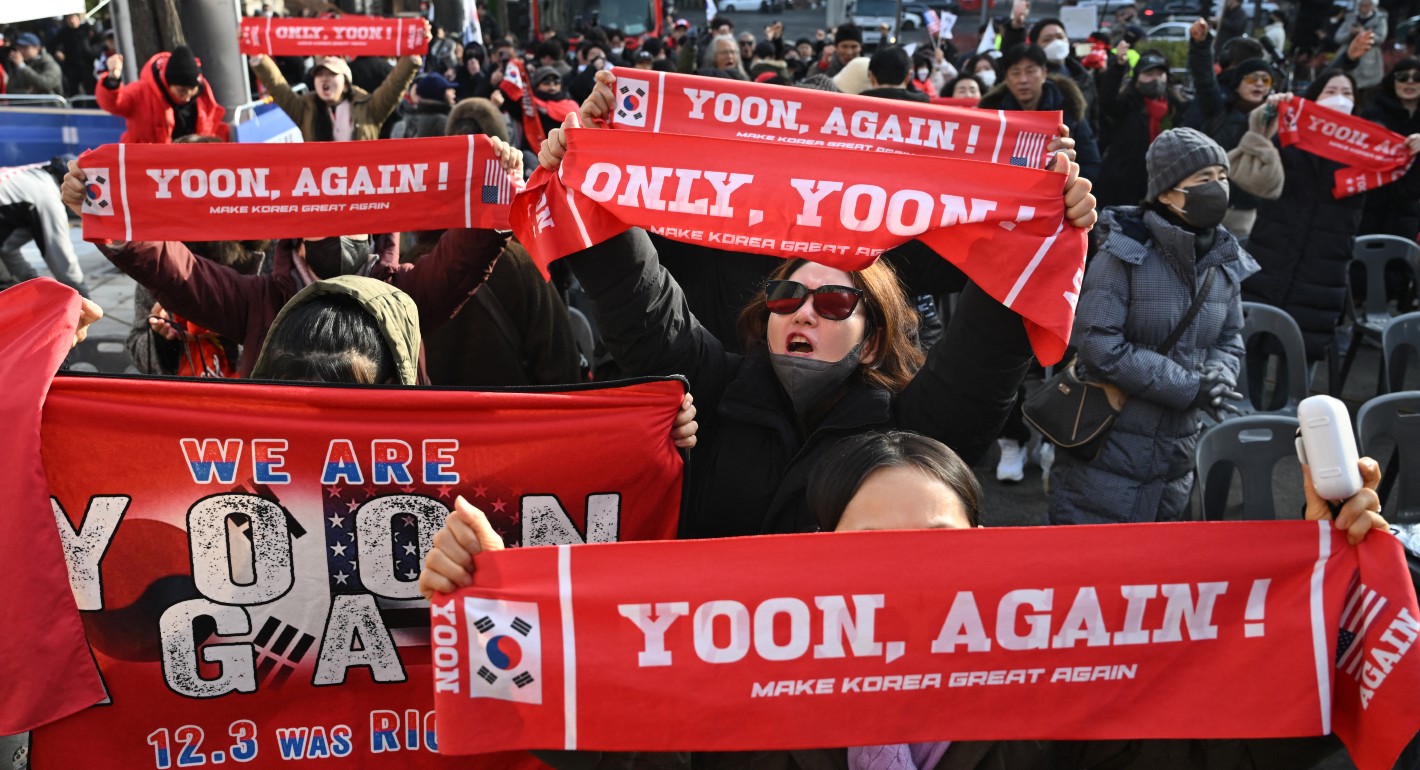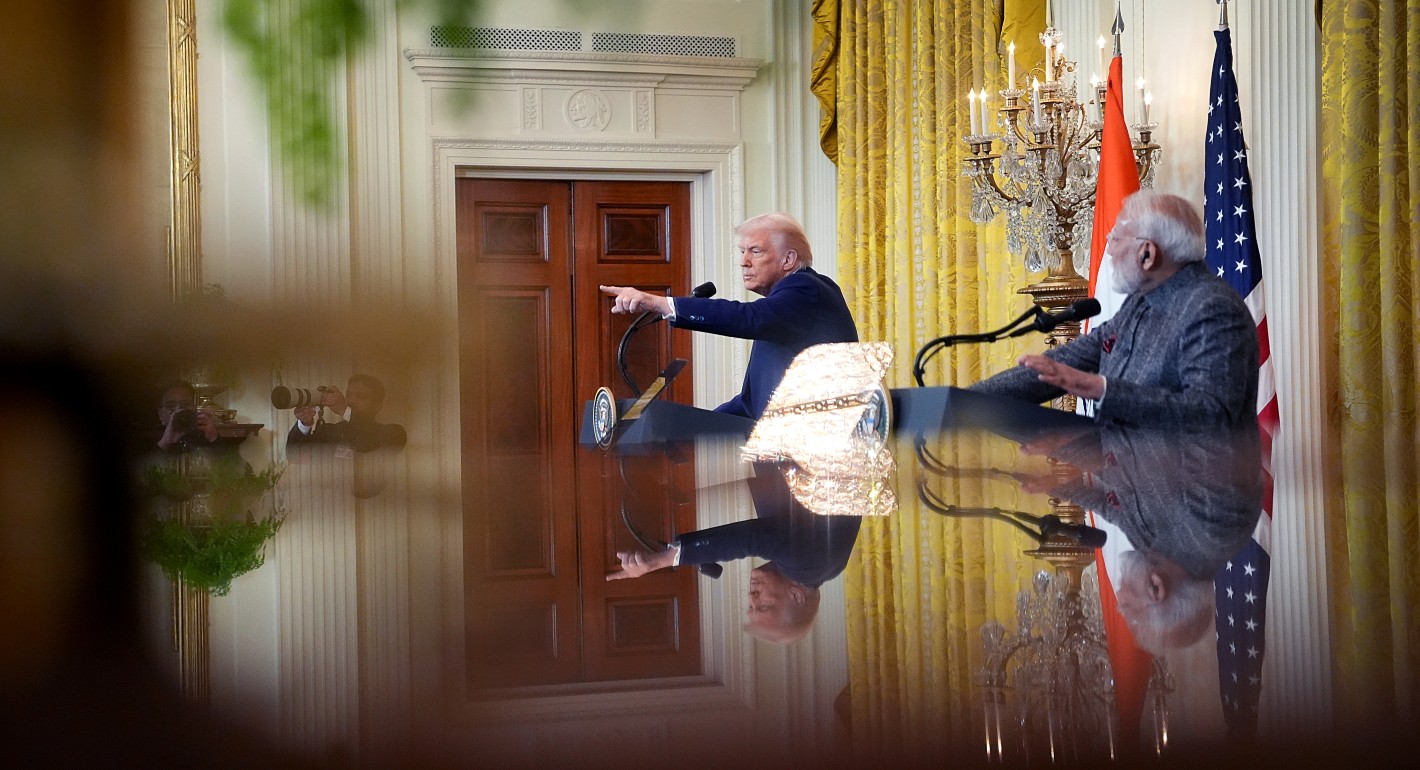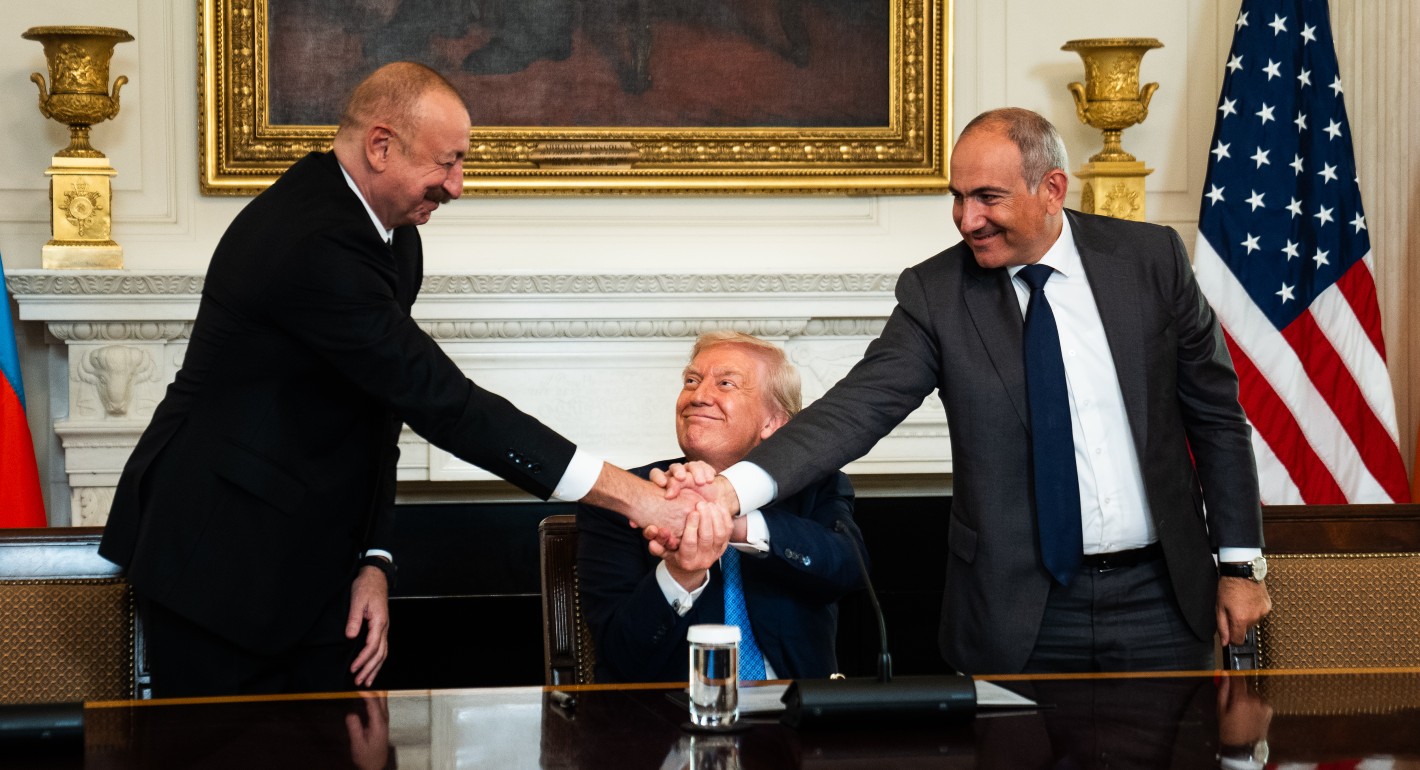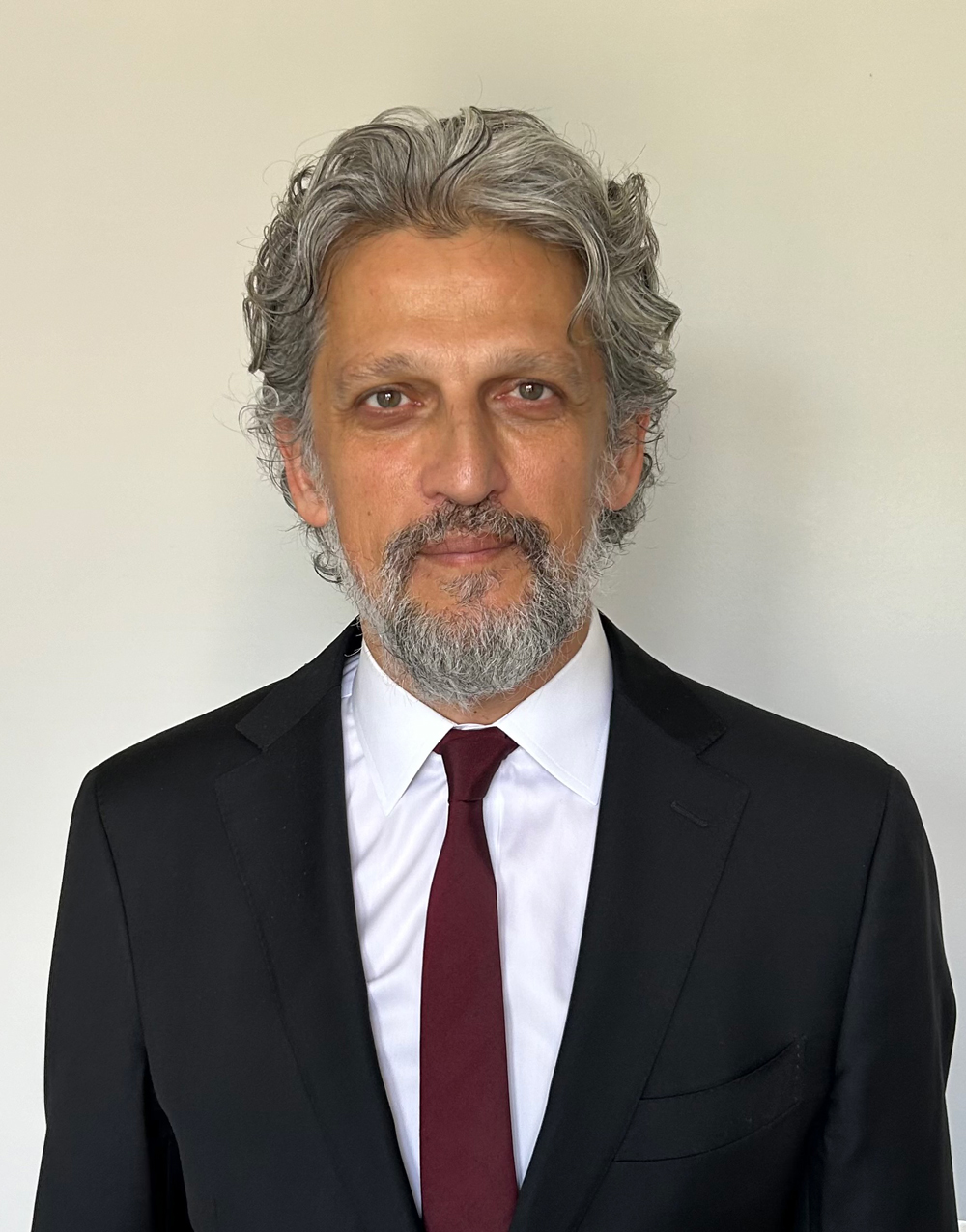Darcie Draudt-Véjares
{
"authors": [
"Darcie Draudt-Véjares"
],
"type": "commentary",
"blog": "Emissary",
"centerAffiliationAll": "dc",
"centers": [
"Carnegie Endowment for International Peace"
],
"collections": [
"Korea: Emerging Player",
"Economic Risk in Asia"
],
"englishNewsletterAll": "asia",
"nonEnglishNewsletterAll": "",
"primaryCenter": "Carnegie Endowment for International Peace",
"programAffiliation": "AP",
"programs": [
"Asia"
],
"projects": [],
"regions": [
"South Korea"
],
"topics": [
"Economy",
"Trade"
]
}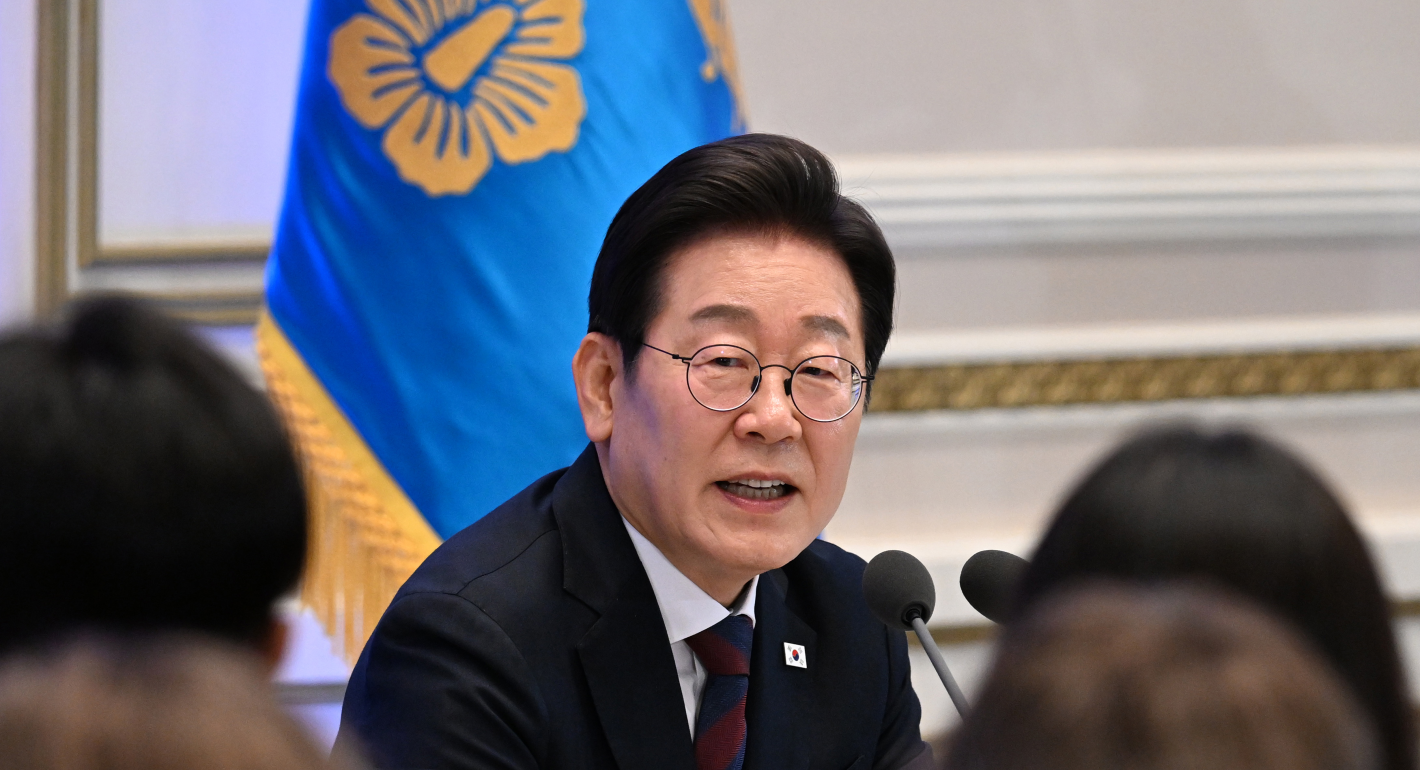
South Korean President Lee Jae Myung delivers a speech during a press conference to mark his first 30 days in office. (Photo by Kim Min-Hee - Pool/Getty Images)
For South Korea’s New President, Trump’s Tariffs Are an Ultimatum
Despite his pragmatic plans, Lee Jae Myung is caught between an export-driven economy, a geopolitical conundrum, and entrenched business interests.
When he assumed office in June, South Korean President Lee Jae Myung inherited a country in crisis. His first priority was restoring political legitimacy to the office of the president following his predecessor’s impeachment for declaring martial law in December 2024. Now, his political credibility depends on an ambitious economic reorientation, including addressing youth unemployment and declining industrial output, among other factors, to reverse South Korea’s sagging economic outlook.
A month later, U.S. President Donald Trump announced 25 percent tariffs on South Korean (and Japanese) goods. Trump’s punitive trade measures—framed as an “invitation” for South Korea to “participate in the extraordinary Economy of the United States”—now threaten to derail the export-dependent recovery that has given Lee’s presidency its early momentum.
Now, Lee’s core challenge isn’t whether his reforms are well-designed, but whether he can overcome the external constraints—from global trade wars to China-U.S. technology competition to global supply chain disruption—that determine South Korea’s economic fate, regardless of Seoul’s policy choices. Lee’s pragmatic promises have sparked cautious optimism, but his ability to deliver depends less on political skill than on geopolitical developments, corporate governance battles with interests of the entrenched chaebol (South Korean multinational conglomerates), and market forces that operate far outside the president’s influence.
Trump’s Economic Ultimatum
Trump’s tariff announcement reveals how dramatically U.S. relations with its key Asian allies have shifted from strategic partnerships to something akin to economic coercion. The official tariff letters to South Korea and Japan are virtually identical, with only country names and leader titles changed, signaling that Trump may view both relationships through the same transactional lens. The ultimatum is stark: Both countries face 25 percent tariffs on all exports unless companies relocate manufacturing to the United States by August 1. Trump characterizes their trade surpluses as threats to the U.S. economy and national security, transforming routine commercial relations into a zero-sum security competition.
Although Japan and South Korea face the same ultimatum, South Korea’s vulnerabilities run deeper. The country’s economy is significantly more trade-dependent, with exports representing over 40 percent of GDP, compared to Japan’s 20 percent. Japan possesses a larger domestic market and lower reliance on trade as a share of economic output, providing more cushion against external shocks. In other words, South Korea’s smaller domestic market means export disruption to the United States hits harder and faster, making Lee’s challenge more acute than Japanese Prime Minister Shigeru Ishiba’s in navigating Trump’s demands while maintaining economic growth.
Trump’s announcement represents an existential threat to Lee’s governing strategy. Lee had staked his candidacy on leveraging South Korea’s strategic value to achieve economic transformation through enhanced U.S.–South Korea cooperation. Trump’s tariffs not only undermine that narrative but force Lee into an impossible choice: accept economic concessions that could devastate South Korean exporters or risk trade confrontation that would destroy the market rally that fuels his political support.
The Geopolitical Vise
Beyond Trump’s immediate tariff threat, Lee must navigate U.S.-China technology competition that forces South Korean companies into impossible choices. Samsung and SK Hynix face restrictions on Chinese operations even as they invest billions in American facilities— including Samsung’s impressive $45 billion investment near Austin, Texas, for semiconductor fabrication lines and research facilities. This market split reduces the flexibility that enabled South Korea’s industrial juggernauts to thrive and forces strategic decisions that compromise global market access regardless of Seoul’s preferences.
The technology competition illustrates how great power rivalry constrains middle power options. South Korean companies built global leadership by serving both U.S. and Chinese markets, but Washington’s security concerns over the past decade—spanning several administrations—have required choosing sides in ways that reduce South Korean competitiveness. Lee’s promises of enhanced U.S. cooperation and domestic innovation sound reasonable in theory, but implementation timelines may not match the market expectations his campaign rhetoric created.
The broader trend toward economic nationalism in major markets limits South Korea’s traditional export-led growth model. While Lee’s proposed pragmatic approach to alliance management may help in bilateral negotiations, the fundamental shift toward geoeconomic competition operates beyond any South Korean president’s influence and constrains the policy space available for domestic economic transformation.
The Limits of Political Pragmatism
Even without external shocks, Lee faces domestic structural challenges that may prove more intractable than his political flexibility can address. For example, the notorious “Korea discount,” caused by concentrated chaebol control and weak shareholder protections, impedes foreign investment. Two-thirds of companies on the Korea Composite Stock Price Index (KOSPI) trade below book value despite strong fundamentals—an issue that stems from sluggish progress on corporate governance reform, chaebols that prioritize founding families over minority shareholders, and regulatory opacity that enables companies to manipulate the markets and economic policies in their favor.
Lee promises mandatory governance changes rather than voluntary guidelines, but implementation requires navigating powerful business interest groups while maintaining the industrial competitiveness that made chaebols economically successful. Previous presidents attempted similar reforms but encountered fierce resistance from entrenched interests. Even activist investors such as Elliott Management failed to block chaebol mergers in 2015—though an international arbitration tribunal ordered the South Korean government to pay Elliott $109 million in damages and legal fees for political manipulation of the merger.
This structural challenge illustrates a broader paradox constraining Lee: Reforming corporate governance without destroying export competitiveness requires cooperation from chaebol families who benefit from the current system. As has been repeatedly the case with past efforts of South Korean governments to pursue chaebol reform, Lee’s political skill may ultimately matter less than whether Samsung, LG, and Hyundai leaderships choose to embrace transparency—a decision that ultimately rests with private actors pursuing their own interests.
Democratic Capitalism’s Constraint Problem
Lee’s challenge extends beyond South Korean politics to fundamental questions about democratic leadership in a globalized economy. His presidency will test whether political pragmatism can deliver structural change when the most important variables—trade policy, technology access, corporate cooperation, and global market conditions—remain outside democratic control.
Corporate leaders and international investors should prepare for a South Korea that pursues market-friendly reforms while navigating political and geopolitical constraints that limit their scope and speed. The retail investor revolution not only provides Lee with unprecedented political capital but also creates pressure for immediate results that external forces may prevent him from delivering.
For Washington, Lee’s economic pragmatism creates opportunities for deeper bilateral cooperation. But U.S. policymakers should recognize that South Korea’s domestic challenges may limit Seoul’s ability to fully align with Washington’s priorities when they conflict with immediate economic survival. Trump’s tariff ultimatum forces exactly this kind of impossible choice.
The next six months will reveal whether Lee’s pragmatic gamble can deliver both market performance and structural progress when success depends largely on forces beyond his control. The stakes extend beyond South Korean politics to questions about democratic capitalism’s ability to address long-term challenges while satisfying short-term political demands in an increasingly constrained global environment. Lee’s presidency may ultimately prove that in a globalized economy, domestic political leadership matters less than the external forces that determine national economic fate.
About the Author

Fellow, Asia Program
Darcie Draudt-Véjares is a fellow in the Carnegie Asia Program.
- What Happens When a Conservative Movement Continues on Without a Leader?Commentary
- South Korea’s APEC MomentCommentary
Darcie Draudt-Véjares
Recent Work
Carnegie does not take institutional positions on public policy issues; the views represented herein are those of the author(s) and do not necessarily reflect the views of Carnegie, its staff, or its trustees.
More Work from Emissary
- Beijing Doesn’t Think Like Washington—and the Iran Conflict Shows WhyCommentary
Arguing that Chinese policy is hung on alliances—with imputations of obligation—misses the point.
Evan A. Feigenbaum
- How Middle Powers Are Responding to Trump’s Tariff ShiftsCommentary
Despite considerable challenges, the CPTPP countries and the EU recognize the need for collective action.
Barbara Weisel
- What Happens When a Conservative Movement Continues on Without a Leader?Commentary
Lessons from Korea’s political right.
Darcie Draudt-Véjares
- The Trump-Modi Trade Deal Won’t Magically Restore U.S.-India TrustCommentary
Washington and New Delhi should be proud of their putative deal. But international politics isn’t the domain of unicorns and leprechauns, and collateral damage can’t simply be wished away.
Evan A. Feigenbaum
- Trump Wants “Peace Through Construction.” There’s One Place It Could Actually Work.Commentary
An Armenia-Azerbaijan settlement may be the only realistic test case for making glossy promises a reality.
Garo Paylan



